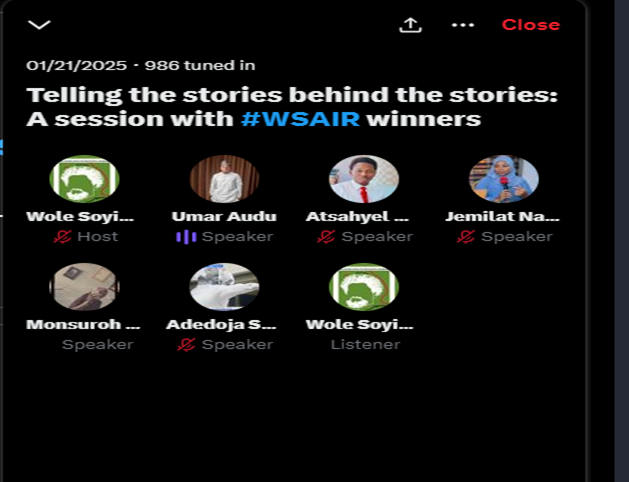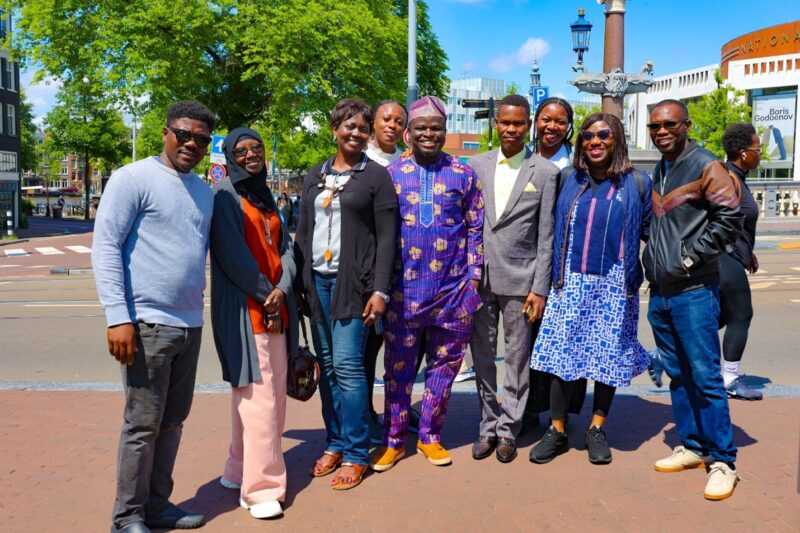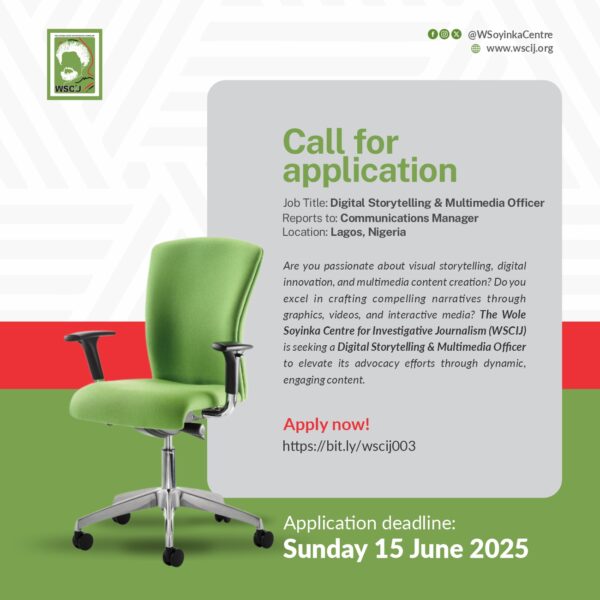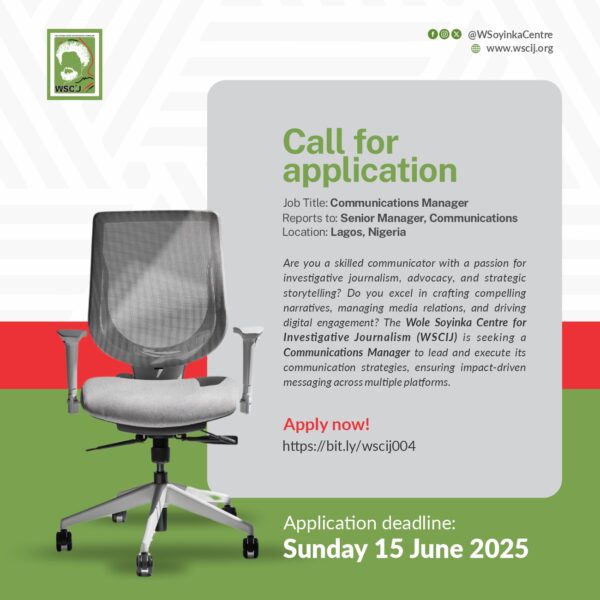A panel of award-winning investigative journalists have underscored the significance of investigative reporting and the vital role of journalism in driving societal change while reflecting on the process and impact of their investigative works during the Society and Journalism Conversations of the Wole Soyinka Centre for Investigative Journalism (WSCIJ) held on Tuesday 21 January.
The panellists selected from authors of winning and commended works for the annual Wole Soyinka Award for Investigative Reporting (WSAIR) discussed the importance of resilience, objectivity, and the personal toll of investigative work. The panel- Umar Audu, investigative reporter, Daily Nigerian Newspaper; Jemilat Nasiru, senior multimedia reporter, TheCable Newspaper; Aaron Atsahyel, reporter, Trust TV; Taiwo Adebayo, Africa business climate reporter, The Associated Press; Adedoja Salam-Adeniyi, Senior Correspondent, TVCNews and Monsuroh Abdulsemiu, journalist at TheCable Newspaper also stressed the need for investigative journalism to hold power accountable and inspire positive change.
Audu Umar reflected on his journey as an investigative journalist, expressing pride in exposing fake certificate rings involving some Benin Republic and Togo universities. He credited his editor-in-chief, Jaffar Jaffar, for initiating the story, which was a follow-up to a 2018 report by Daily Nigerian. Umar highlighted planning, perseverance and the collaborative efforts of his team as key to the investigation that had a transformative impact on the education sector. Speaking on the impacts, Umar recalled that the report led to public outrage, commendations, and swift government actions. These included suspending accreditations for affected universities, invalidating over 22,700 fake certificates, and forming an interministerial committee to investigate. The National Assembly also debated the issue, and the Independent Corrupt Practices Commission (ICPC) also arrested and prosecuted perpetrators. Despite not winning the Wole Soyinka Award for Investigative Reporting, the Abuja-based journalist felt fulfilled by the societal impact of his work. Addressing how he managed his mental health and threats, the investigative reporter with the Daily Nigerian explained that he avoided triggers and distanced himself from depressing stories as he credited his family for their emotional support.
During the conversation, Adedoja Salam-Adeniyi highlighted the importance of investigative journalists in uncovering the truth. She said her commended work in the television category at the 2024 WSAIR stemmed from her in-depth report after police authorities initially attempted to suppress the story of a 12-year-old girl hit by police tear gas. During the experience-sharing session, she described the detailed process of investigative reporting, from pitching and research to storyboarding and using audio-visual tools for story gathering. Despite the challenges, its impacts— the Inspector General of Police ordering an investigation and cash support from Nigerian for the survivor- make it worthwhile. She urged journalists to maintain objectivity, even when covering emotionally charged stories, and remain cautious of security risks, especially when reporting on sensitive topics like police brutality and corruption.
Jemilat Nasiru whose collaborative story with Ibrahim Mansur titled ‘Living on borrowed time (I): How Nigeria’s unchecked e-waste is poisoning residents, environment ’ won the coveted prize in the online category of the 2024 WSAIR highlighted the importance of research and funding for investigative reports. The Cable Newspaper reporter underscored the collaborative nature of investigative reporting. She advised investigative journalists to stay resilient while investigating their stories.
Another speaker, Aaron Atsahyel of Trust TV shared his experience investigating the tragic kidnapping case in Abuja, titled ‘Stolen innocence; Nabeeha’s tragic abduction.’ He recalled seeing the story on social media during the Christmas holiday in 2023, amid a surge of kidnappings. He described the significant challenges he faced, particularly the community’s resistance and the reluctance of some Nigerian Police officers to share information. Speaking about the emotional toll and anguish of the families of the kidnapped. He said his team had to pause the investigation due to the emotional and mental strain on everyone involved. Reflecting on the experience, he picked the project as his most significant investigative work, emphasising the importance of persistence and resilience in overcoming barriers and setbacks. He said winning the television category at the 2024 WSAIR marked a milestone in his career.
For Taiwo Adebayo, he reckoned that the quality of democracy in any society heavily depends on the quality of its journalism. Therefore, investigative journalists must ensure access to accurate and actionable information to empower people make informed decisions about governance. The 2022 WSCIJ-Nigerian Investigative Journalist Of The Year maintained that the media must hold the government accountable rather than act as a tool of public relations for the government. The former editor and head of Investigations and Data at Premium Times shared that his most significant investigative work ‘Pandora Papers series‘, spanned over two years. He highlighted several challenges, including maintaining confidentiality and the pressure from influential individuals who launched targeted campaigns to suppress the story. Despite not making much impression in Nigeria despite several promises from the Federal Inland Revenue Service (FIRS) and the Code of Conduct Bureau to investigate and prosecute offenders, the global impact contributed to the introduction of a law requiring the declaration of the beneficial owners of foreign companies investing in the property market to prevent the use of tax havens to hide illicit funds. He said these reforms showcased the importance of investigative journalism in driving accountability and systemic change.
In his parting words to aspiring journalists, Atsahyel said investigative reporting is beyond a profession but a commitment to uncovering and reporting the truth, exposing human rights abuses, environmental destruction, and social injustices while Salam-Adeniyi maintained that beyond awards, the society impacts and the positive changes make the process worthwhile. Nasiru charged journalists to recognise their power to empower the public to make informed choices. She believes this will spur them to become dedicated to producing high-quality and public-interest stories. Adebayo advised the media to remain focused on accountability and investigation. He tasked journalists to write stories that expose injustice, drive social change that can lead to systemic reforms, and improve the lives of vulnerable populations. Audu called for courage in the face of threats, harassment, and lack of support as he advocated for institutional insurance and mental health support while prioritising journalists’ safety.
The #WSCIJConversations brings stakeholders together to discuss the pressing issues of press freedom, regulatory frameworks, and the pivotal role of investigative journalism in holding the government accountable and contributing to nation-building.








